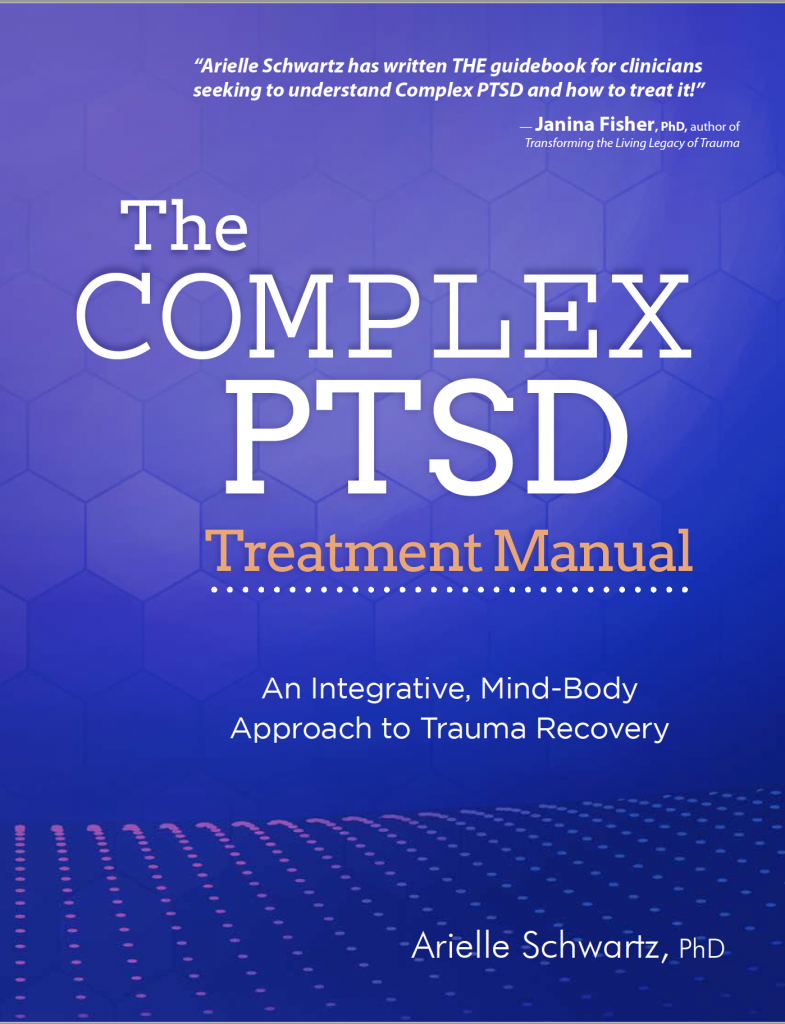An Integrative, Mind-Body Approach to Trauma Treatment

I am thrilled to announce the publication of The Complex PTSD Treatment Manual: An Integrative, Mind-Body Approach to Trauma Treatment. This book is written for clinicians who are helping clients navigate the consequences of repeated or chronic traumatization. This is a roadmap for therapy with clients who have experienced prolonged and chronic exposure to traumatic events.
This book offers a deep dive into the ways in which therapy is a combination of head and heart, of science and art. A mind-body approach to trauma recovery is now recognized as essential to successful treatment for we simply cannot think our way out of these innate, physiological responses to trauma. Successful treatment requires a compassionate therapeutic relationship and effective, research-based interventions. This integrative model brings together relational therapy, mindful body awareness, parts work therapy, cognitive behavioral therapy (CBT), eye movement desensitization and reprocessing (EMDR), somatic psychology, and practices drawn from complementary and alternative medicine (CAM).
“Our brains are malleable and have the capacity to develop new neural connections throughout our lifespan. That means that the effects of trauma, which are known to adversely impact the brain, are not immutable. With therapy, the brain can rewire itself and heal from the emotional injuries of the past. An integrative approach to treatment allows us to adapt the focus of our work to meet the needs of each specific client by recognizing that there is no single therapeutic method that is appropriate or effective for all clients. A compassionate approach to care asks us to nonjudgmentally accept each client within the context of their unique social and cultural challenges.”
High Praise for The Complex PTSD Treatment Manual
“Arielle Schwartz has written THE guidebook for clinicians seeking to understand Complex PTSD and how to treat it! On every page, she interweaves up-to-date theoretical ideas with practical clinical wisdom. Every word of this book can easily be implemented by therapists regardless of their training or approach.” ~Janina Fisher, PhD author of The Fragmented Selves of Trauma Survivors and Transforming the Living Legacy of Trauma
Pre-Order Your Copy Today
Understanding Complex PTSD

Many mental health practitioners are trained in the treatment of single traumatic events and the diagnosis of post-traumatic stress. However, more often, our clients come to therapy with an extensive history of trauma that begins in childhood and continues into adulthood with layers of personal, relational, societal, or cultural losses. This is complex trauma. In some cases, complex PTSD (C-PTSD) begins in early childhood when individuals experienced repeated abuse or profound neglect. C-PTSD can also develop from unremitting social stress including the COVID pandemic, ongoing racialized trauma, living in poverty, or growing up in a war-torn country.
C-PTSD is characterized by psychological symptoms such as debilitating flashbacks, emotional dysregulation, dissociative episodes, and pervasive feelings of hopelessness and despair. Traumatic events are not simply remembered, they are relived as if they are still occurring. Especially when clients have dissociative symptoms, there may be few clear images or memories; however, they might report feeling flooded by emotions and sensations or they may have somatic symptoms, such as chronic pain and illness symptoms that flare up during times of stress.
This book guides you to effectively work with clients who have experienced multiple traumatic events and prolonged trauma exposure. These strategies are grounded within an approach to trauma treatment that is both strength-based and resilience-informed. A strength-based approach emphasizes our inherent capacity to heal from trauma when we have sufficient access to resources and support. A resilience-informed approach to care maintains that every human being has an intrinsic drive toward wholeness once those resources and supports are in place.
Double Binds, Betrayal Trauma, and Dissociative Symptoms

When individuals are not able to flee from an abusive situation or fight off an abuser, they tend to feel helpless. Children who experience abuse from a primary caregiver are often faced with a biologically driven conflict between their need to flee a dangerous environment and their need to attach to the parent. There is an inherent double bind between this inborn need for closeness and the equally strong need to escape danger. These complex dynamics can lead to pervasive feelings of shame, guilt, self-blame, and despair accompanied difficulties with trusting other people. Some experience a profound existential loneliness or sense of despair about the state of the world. Collectively, these feelings can interfere with a sense of meaning, purpose, or hope for the future.
The Complex PTSD Treatment Manual guides you to work with client’s dissociative symptoms through careful attention to the biological roots of symptoms the are held deep within the autonomic nervous system, brain stem, and vagus nerve. Oftentimes, individuals with C-PTSD have a compromised capacity for self-regulation because they did not receive sufficient co-regulation in childhood. They did not grow up in a caring environment characterized by attunement, connection, and safety. Therapy provides an opportunity for clients with C-PTSD to develop relational trust through the experience of compassionate attunement and co regulation which strengthens vagal and improves their ability to tolerate or recover from stress.
A Cultural Context

Throughout this book, you are asked to consider your client’s social, developmental, and cultural contexts throughout all phases of treatment. This allows us to acknowledge how their self-protective, defensive reactions may continue to be necessary. If we treat fear-based symptoms without considering contextual and systemic problems they are likely to feel misunderstood and we risk doing harm. Thus, we must always consider situational factors when working with any client who is currently being mistreated or discriminated against, especially when the underlying racism, classism, or religious bias has not been addressed within the external community or societal context.
Furthermore, when clients were or are the target of racial oppression, discrimination, harassment, or threats, we must consider the ways in which these individuals have been betrayed by other humans. They may have faced profound helplessness and powerlessness which contributes to a depletion of mental and emotional resources. They may continue to feel that their actions will not make a difference in the outcome their lives.
Complex dynamics can lead to power struggles within the therapeutic relationship. If left unaddressed, a buildup of poorly attuned moments in therapy can result in feelings of confusion, frustration, and disconnection for both the therapist and the client. However, as clinicians, our willingness to work through our own defensiveness, capacity to admit when we have made mistakes, and commitment to repairing therapeutic ruptures is essential to successful treatment. Moreover, this process aligns with an intention to reduce the impact of oppression, discrimination, and marginalization in our clients’ lives.
We must remember, these individuals are not “broken”; they are hurt and in need of compassionate care. If we do our jobs well, we might be given a sacred task: to bear witness to their suffering and attend compassionately to their wounds. This book will help you become a trustworthy companion, capable of guiding a healing journey for clients with histories of abuse or neglect.
High Praise for The Complex PTSD Manual
“Dr. Schwartz’s book is likely to be a big help to clients with severely traumatic life histories, as well as to the therapists who treat them. It is very readable and accessible. Reading it gives a feeling of being in a conversation with Dr. Schwartz. The chapters give many examples of how cognitive behavioral therapy, somatic experiencing, and EMDR can be successfully integrated in therapy preparation, diagnostic assessment, and treatment planning. It also includes many transcripts of therapy sessions, which illustrate with clarity how particular interventions can be effectively used. This book is a significant contribution to our developing knowledge of the best ways to treat complex PTSD and dissociative conditions.” ~Jim Knipe, PhD, Author of EMDR Toolbox: Theory and Treatment for Complex PTSD and Dissociation
“Dr. Schwartz guides us into a field of healing practices and possibilities founded in a resilient-informed approach. She offers portals into the untold and hidden stories of pain that live in the nervous system and the biology of the people affected by chronic traumatization. She reminds us of the power and strength that lay at the core of human existence and put us in touch with our inner capacities. The Complex PTSD treatment Manual is a rich, comprehensive, well-integrated, and immensely useful masterpiece that will support child and adult therapists working with C-PTSD in bringing healing to generations!” ~Ana M. Gomez, MC, LPC Author of EMDR therapy and Adjunct Approaches with Children: Complex Trauma, Attachment and Dissociation
“Arielle Schwartz does it again, delivering clinicians a practical volume full of useful skills and her uncanny ability to translate complex neurological concepts into relatable language. I am especially impressed with the sensitivity and humanity that she employs in addressing parts work and dissociation. This is a marvelous foundational volume on complex trauma that I will be very happy to recommend to my students.” ~Dr. Jamie Marich, The Institute for Creative Mindfulness, Author of EMDR Made Simple, Trauma Made Simple, and many other books on trauma recovery
“The Complex PTSD Treatment Manual is an essential masterpiece for any clinician working in the fields of trauma, complex PTSD and Mind-Body Medicine. Integrative health providers will love it. Woven into the academic rigor of this masterpiece are practical healing practices and embodied exercises for the lucky reader. It is a perfect balance between personal transformation roadmap and scholarly treasure. Dr Schwartz takes us on a highly attuned and compassionate journey through multiple trauma-healing modalities and presents them in a user-friendly, practical way. The psychological needs arising at this post-pandemic juncture are different than they’ve ever been & this will surely be your indispensable reference book for years to come. This book is a must have!” ~Dr Ilene Naomi Rusk, Integrative Trauma Therapist, Director: Healthy Brain Program, Brain & Behavior Clinic, Colorado Clinical Neuropsychologist, Ontario, Canada
“Arielle Schwartz has crafted an up to date synthesis of many of the best practices of the evolving science of resolving complex PTSD. This highly practical treatment manual is an essential guide for beginner therapists, and a useful summary for seasoned clinicians. Bravo!“ ~Will Van Derveer MD, Co-founder, Integrative Psychiatry Institute
“Dr. Arielle Schwartz has done it again. A thorough explanation of the reasons Complex Trauma exists, how it expresses in behaviors and what treatment entails. An important foundation for therapists treating Complex Trauma. Knowing these foundational insights will make treatment easier and more effective.” ~Annie Brook, PhD, Founder of The Brook Institute, Author of Birth’s Hidden Legacy and other books focused on healing developmental trauma.
Pre-Order Your Copy Today

Arielle Schwartz, PhD, is a psychologist, internationally sought-out teacher, yoga instructor, and leading voice in the healing of PTSD and complex trauma. She is the author of six books, including The Complex PTSD Workbook, EMDR Therapy and Somatic Psychology, and The Post Traumatic Growth Guidebook. Dr. Schwartz is an accomplished teacher who guides therapists in the application of EMDR, somatic psychology, parts work therapy, and mindfulness-based interventions for the treatment of trauma and complex PTSD. She has a depth of understanding, passion, kindness, compassion, joy, and a succinct way of speaking about very complex topics. She is the founder of the Center for Resilience Informed Therapy in Boulder, Colorado where she maintains a private practice providing psychotherapy, supervision, and consultation. Dr. Schwartz believes that that the journey of trauma recovery is an awakening of the spiritual heart.
